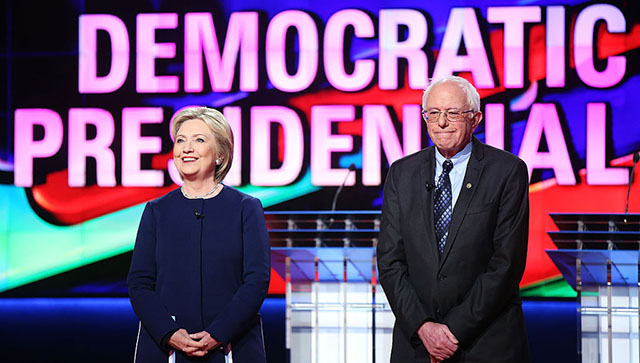Clinton And Sanders Address Flint's Water Crisis During Latest Debate
By aaroncynic in News on Mar 7, 2016 3:45PM

Democratic presidential nominee contenders Hillary Clinton and Bernie Sanders ahead of the March 6th debate at the Whiting Auditorium at the Cultural Center Campus in Flint, Michigan. Photo by Scott Olsen/Getty Images.
Choosing Flint—an economically depressed, predominantly African-American city where the water is actual poison—as a backdrop for the debate highlighted the failures of local government and policies that favor “free market” economics over citizens. Though both candidates tried at times to return to familiar talking points and tropes throughout the two-hour discussion, both were forced to answer tougher questions about actual issues affecting the American people.
As each party has thinned the heard of potential presidential candidates ahead of their respective conventions where nominees will be chosen, actual discernible differences between rivals on both sides have faded in favor of more sensational sound-bites, insults and “gotcha” moments. While the Democratic debates have been generally more subdued than their Republican counterparts, the debate in Flint showed that while there are policy similarities between Clinton and Sanders, there are important differences between the two which go beyond their financial backers or which candidate makes the best case to defeat assumed Republican nominee Donald Trump.
The Democratic establishment has long been waiting to hand the nomination to Clinton, but between Sanders’ performance at the debate and picking up wins in several state primaries over the weekend, the Vermont senator is still very much still in the game. When asked whether or not the candidates would fire the head of the Environmental Protection Agency for failing in Flint or whether they support fracking, Sanders was definitive in his answers (yes and no, respectively), while Clinton meandered, stopping short of committing to a course of action. Sanders was able to pivot Clinton’s criticism of his refusal to support the auto industry bailout to his favorite talking points about Wall Street, and he was able to link free trade policies with the economic situation in Flint.
The event wasn’t without gaffes, however. Sanders’ use of the word “ghetto” in a conversation about ‘racial blind spots’ was particularly grating, and his ‘joke’ about Republicans and mental health was terribly insensitive. “You know, we are, if elected president, going to invest a lot of money into mental health,” said Sanders. "And when you watch these Republican debates, you know why we need to invest in that."
The top two takeaways from the debate though are both mind-numbing and infuriating: It felt refreshing to have a seat at the adults table—where there was very little shouting and no one felt the need to speak about their genitals—but that we’re currently in an election cycle where that’s a possibility is just painful. More painful though, is that this discussion was held in a city whose residents are not only impoverished due to decades of economic policies that have favored big business, but where the water is actual poison thanks to the same.